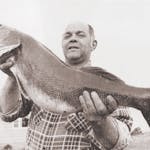The winter walleye season on Upper Red Lake is over, but the lake association's Keep it Clean Committee remains in high gear.
Focused on stopping ice anglers from polluting the lake with human bio-waste, the group has planned for the rollout next season of a dumpster campaign to collect bags of excrement expected to total at least 3,000 pounds over a full winter season.
"This is a terrible problem,'' said Robyn Dwight, president of the Upper Red Lake Area Association. "We've seen all kinds of evidence out on the lake.''
Initial funding already is secured to promote the program and launch it at four high-traffic access sites frequented by anglers. And while Red Lake's stewards scramble for additional funding to sustain the collections, they're also exploring where to build an all-season "sani-dump'' for wheelhouses equipped with holding tanks.
The group also has drafted a bill for next year's Legislature to consider. As worded, it seeks an appropriation of $750,000 "for the prevention of water pollution due to general and human waste on water bodies from winter use activities.''
More than that, Dwight and her committee members will meet next month with peers at Lake of the Woods and Mille Lacs. The trio of "ice belt'' lakes have formed an alliance to widen the Keep it Clean initiative started 10 years ago on Lake of the Woods when loads of trash from ice anglers washed ashore in the spring.
Joe Henry, executive director of Lake of the Woods Tourism, said there's more and more need for public awareness campaigns and enforcement as more people turn to wheelhouses for extended, independent stays on the ice. For the many pods of rented fish houses, resorts and other businesses generally provide services for the handling of trash and septic waste.
"With ice fishing becoming so popular, this is an ice belt issue,'' Henry said. "We need to deal with human waste.''
The scope of the problem is evident in various statistics. At Upper Red Lake, the DNR estimated 85,000 overnight stays by ice anglers in the 2020-2021 season. At Lake of the Woods, the surge in winter walleye tourism is reflected in the county's garbage tonnage. The five-year monthly average for the county is 225,000 tons. But collections spike in January, when ice anglers far outnumber the county's population of 3,800 people. The record-high garbage intake was set in January 2020, when volume soared to 350,000 tons. In January 2021, the garbage intake was 330,000 tons.
A.J. Pirkl, public works director for Lake of the Woods County, said ice anglers have commonly combined plastic bags and five-gallon buckets to create makeshift commodes. When those bags get mixed in with rubbish, it's a problem to separate them for proper routing to disposal facilities.
"We've struggled with this for a couple of years now and it's starting to stress us a bit,'' Pirkl said.
He said resorts are increasingly turning to porta-potties to keep waste streams separate, but much of the growth in ice fishing has come from independents who wheel onto the lake by paying an ice road toll. They stay for days on end, often in wheelhouses not equipped with heated, sanitary holding tanks.
Pirkl said the Keep it Clean Committee on Upper Red Lake has a good idea in play with its dumpster pilot project. The four 30-yard containers will be designated strictly for the disposal of human waste contained in biodegradable red bags. The complimentary bags will be handed out to anglers on their way onto the lake.
Keeping the "poop bags'' separate from other garbage generated on Upper Red's ice is important because they are not supposed to be burned in the Polk County garbage incinerator that accepts rubbish from Beltrami County. Instead, the human waste will be carried to a landfill, also in Polk County, by a properly licensed hauler.
Zach Gutknecht is the clean water specialist for the Beltrami County Soil & Water Conservation District. He's been active in Upper Red Lake's effort to route ice anglers' sewage off the lake. Some of the spillage by ice anglers has been intentional, he said, but much of it happens inadvertently when garbage or bags of excrement are placed outside a fish house. When uncontained, the trash gets blown around, forgotten or frozen to the ice and snow.
"Hopefully people will use the bags and place them in the dumpsters instead of dumping them on the lake or pulling the plug (on their holding tank) while going down the road,'' Gutknecht said.
Upper Red Lake has an advantage over Lake of the Woods by virtue of a Beltrami County ordinance — written with Red Lake ice fishing in mind — requiring any business involved in providing lake access to maintain a trash dumping location for its customers.
Robyn Dwight, of the Upper Red Lake Keep it Clean Committee, said her group is in talks with the county to toughen the solid waste ordinance to prohibit trash from touching the ice. Ideally, a new ordinance would require ice anglers to store their trash, including poop bags, in containers or in their vehicles.
Dwight also said there could be a future push by Keep it Clean for a state littering law specific to frozen lakes that could be enforced during ice fishing season by state conservation officers.
She said the message of her group's campaign is simple: "Human waste does not belong on the ice, under the ice, or along our shorelines.''







